Choosing the right customer service platform and gladly alternative is one of the most critical decisions for businesses especially in today’s world where social media plays a major role in shaping customer expectations and interactions that want to provide exceptional customer support.
While Gladly alternative is popular for its focus on personalized customer interactions, businesses often need a robust ticketing system to ensure smooth support operations and omnichannel capabilities, it may not fit every organization’s needs.
Whether it’s due to budget constraints, required features, or compatibility with your existing customer service process, exploring alternatives can open doors to solutions better suited for your business.
This article will introduce you to 12 highly-rated Gladly alternatives. We’ll cover their key features, pricing models, and suitability for different industries like ecommerce businesses, startups, and SaaS companies. Modern customer service software demands multi channel support, allowing businesses to handle interactions seamlessly across platforms By the end, you’ll have a clearer understanding of which customer service software will empower your support team and enhance your customer satisfaction ratings.
But first, let’s look at what makes a comprehensive solution for modern customer support teams and This article will introduce you to 12 highly-rated Gladly alternatives, focusing on key features like reporting and analytics, pricing models, and suitability for different industries. why the right choice can make a difference in improving customer engagement and support performance.
Criteria for Selecting Help Desk Solutions
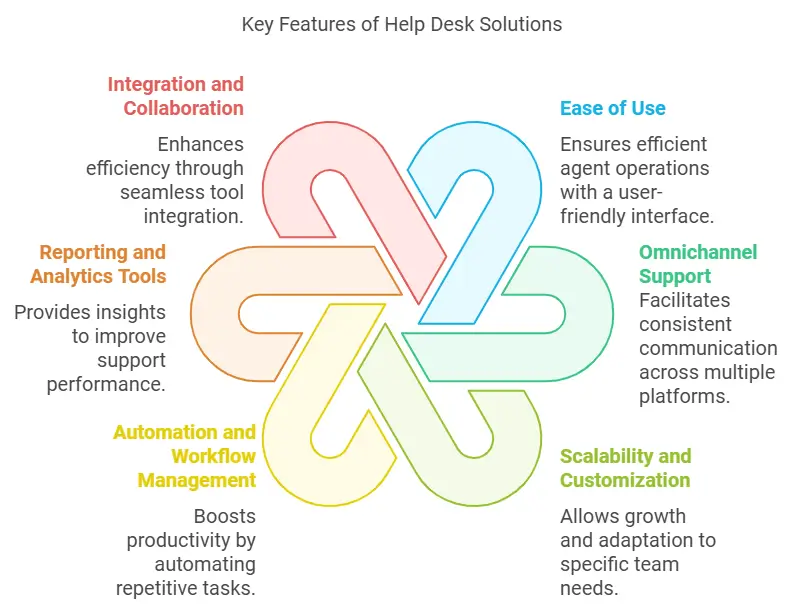
Exploring a Gladly alternative can open doors to finding a solution better tailored to your team’s needs, whether you’re prioritizing omnichannel support, automation, or cost-effectiveness. With dozens of customer support software options available, narrowing down the best fit for your business requires focusing on a few essential factors. Here are the key features and considerations to keep in mind when evaluating Gladly alternatives:
1. Ease of Use
A user-friendly interface is crucial for support agents to work efficiently. Look for tools that simplify the ticketing system and centralize customer interactions, ensuring smoother operations for your support teams. A user-friendly ticketing system simplifies how agents manage customer question, ensuring faster resolution and improved workflows.
2. Omnichannel Support
Modern customer service strategies demand solutions that handle customer interactions across multiple channels, including live chat, email, phone, and social media. This ensures consistent customer communication, even when the same customer switches between platforms. A user-friendly live chat interface allows agents to resolve queries quickly, boosting operational efficiency.
3. Scalability and Customization
Startups and SMBs often prioritize flexibility. Your chosen platform should grow with your needs, offering both basic features for smaller teams and more advanced features as your business scales. Customization is another plus, allowing you to tailor the tool to your specific customer service team requirements.
4. Automation and Workflow Management
Automating repetitive tasks like assigning tickets or sending follow-ups with automation tools and automated workflows can boost agent productivity and free up time for personalized customer service software.
5. Reporting and analytics Tools
Insightful reporting and analytics are vital to track support performance and identify areas for improvement. Metrics like agent performance, Client approval ratings, and response times help support teams fine-tune their processes. Analyzing customer interactions with the knowledge base helps identify gaps in content and refine resources for better self-service options
6. Integration and Collaboration
Seamless integration with tools like CRMs (e.g., Salesforce Service Cloud or HubSpot Service Hub), Social media platforms and project management tools is essential for efficient workflows. Platforms that offer collaboration tools also help support agents resolve customer inquiries faster by working as a team. Tools with robust reporting and analytics can integrate seamlessly with CRMs, giving a unified view of customer data for better decision-making.
7. Self-Service Options
Many customers prefer solving their issues independently. A robust self-service client portal or knowledge base can reduce the number of support tickets and empower customers with quick solutions.
8. Cost and Pricing Models
Finally, consider the pricing structure—whether it’s agent-based pricing model or flat rates. Ensure it aligns with your budget while offering the advanced features you need. For example, some Service desk tools solutions charge per user, while others cater to small businesses with all-in-one pricing.
By keeping these criteria in mind, your business can select a customer support solution that not only meets today’s needs but also supports long-term customer relationships and Support team workflows
Top 12 Gladly Alternatives
1. Desku
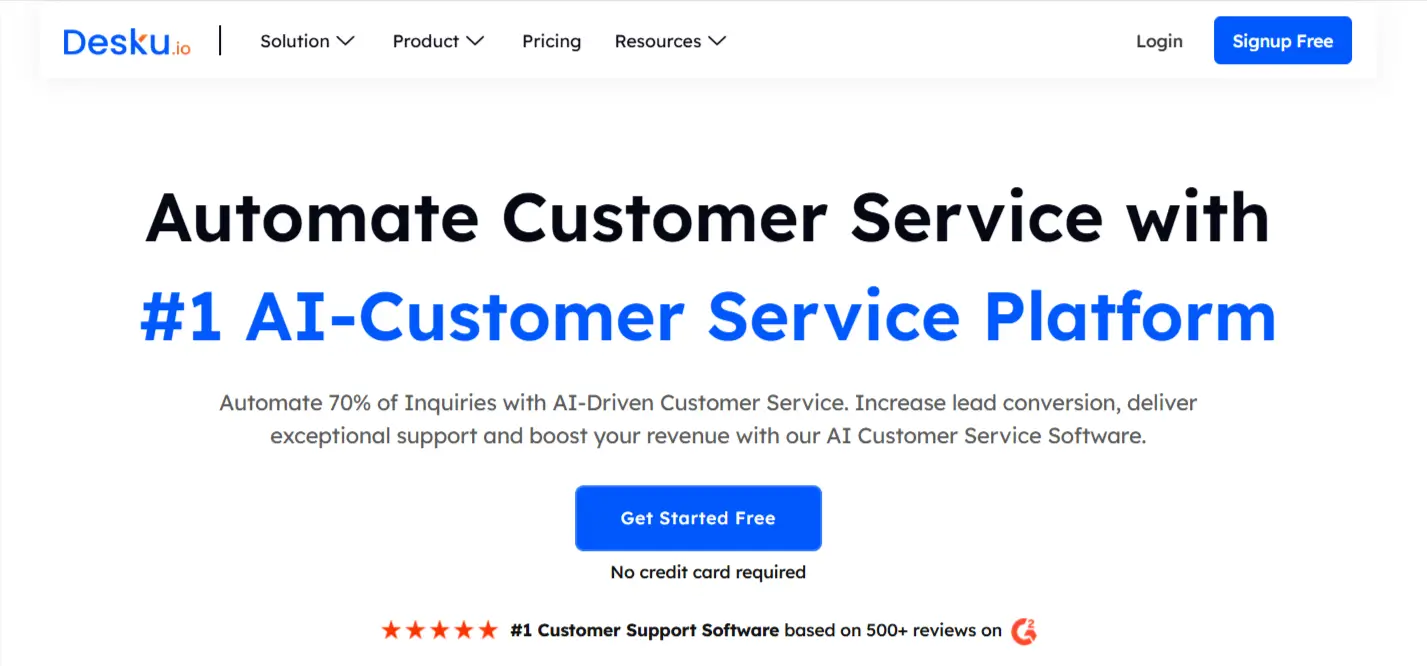
- Key Features:
- AI-powered customer support software with live chat, AI chatbots, and ticketing system.
- Omnichannel support integrating multiple communication channels.
- Automation tools for streamlined customer service operations.
- Self-service options including a knowledge base.
- Pricing:
- Starter plan at $18/month for up to 5 agents (billed annually).
- Unlimited agents at $28/month (billed annually).
- Pros:
- User-friendly interface suitable for small to medium-sized businesses.
- Affordable pricing with comprehensive features.
- AI-driven automation enhances agent productivity.
- Cons:
- Design customization options are limited but improving.
- Some advanced features may be less robust compared to larger competitors.
2. Freshdesk
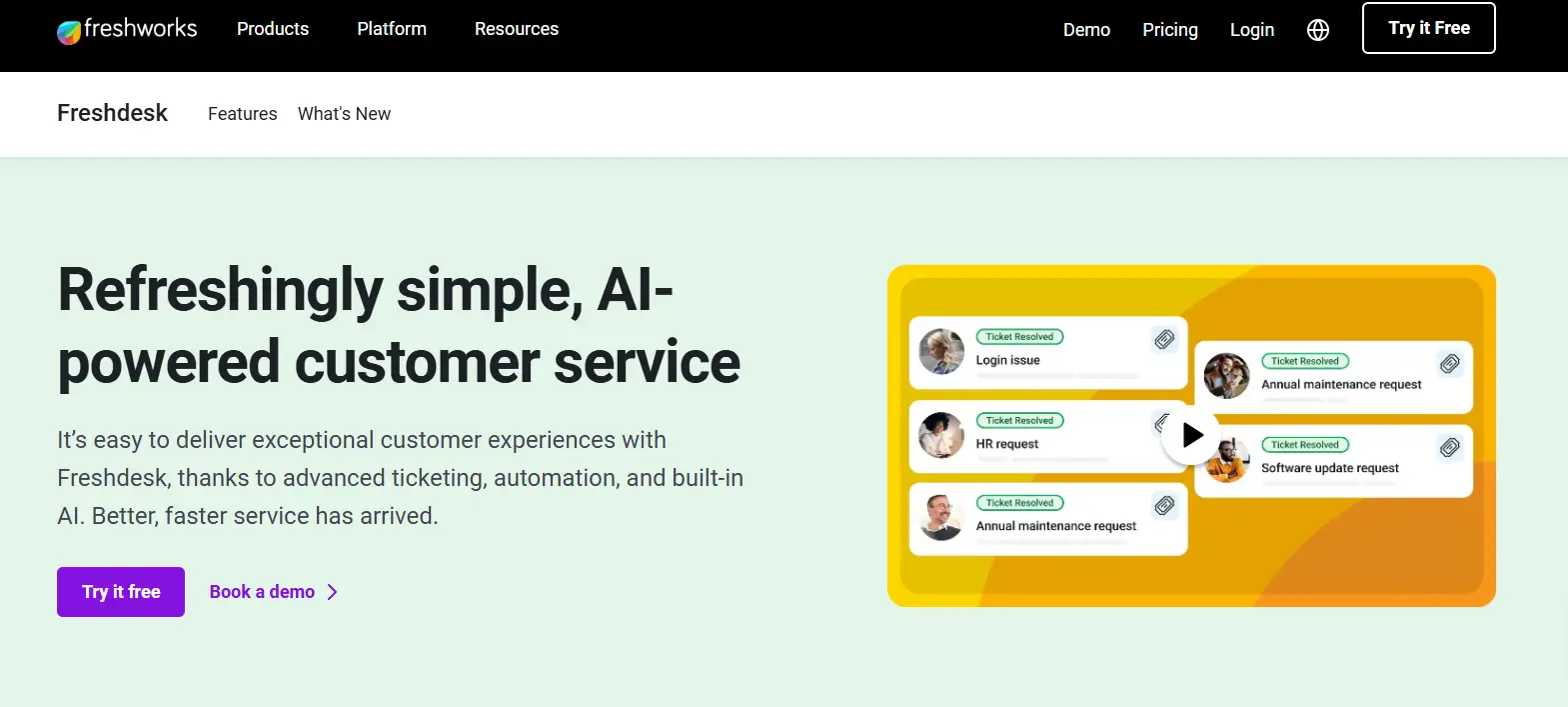
- Key Features:
- AI-powered support tickets system.
- Self-service features like a knowledge base.
- Collaboration tools for support teams.
- Affordable entry-level plans.
- Pricing:
Free plan available; paid plans start at $15 per agent/month. - Ideal For:
Small businesses and startups looking for cost-effective solutions with room to scale. - Pros:
- Easy-to-use and intuitive interface.
- Budget-friendly for startups and small businesses.
- Excellent self-service capabilities.
- Cons:
- Limited advanced features in lower-tier plans.
- Fewer customization options compared to competitors.
3. HubSpot Service Hub
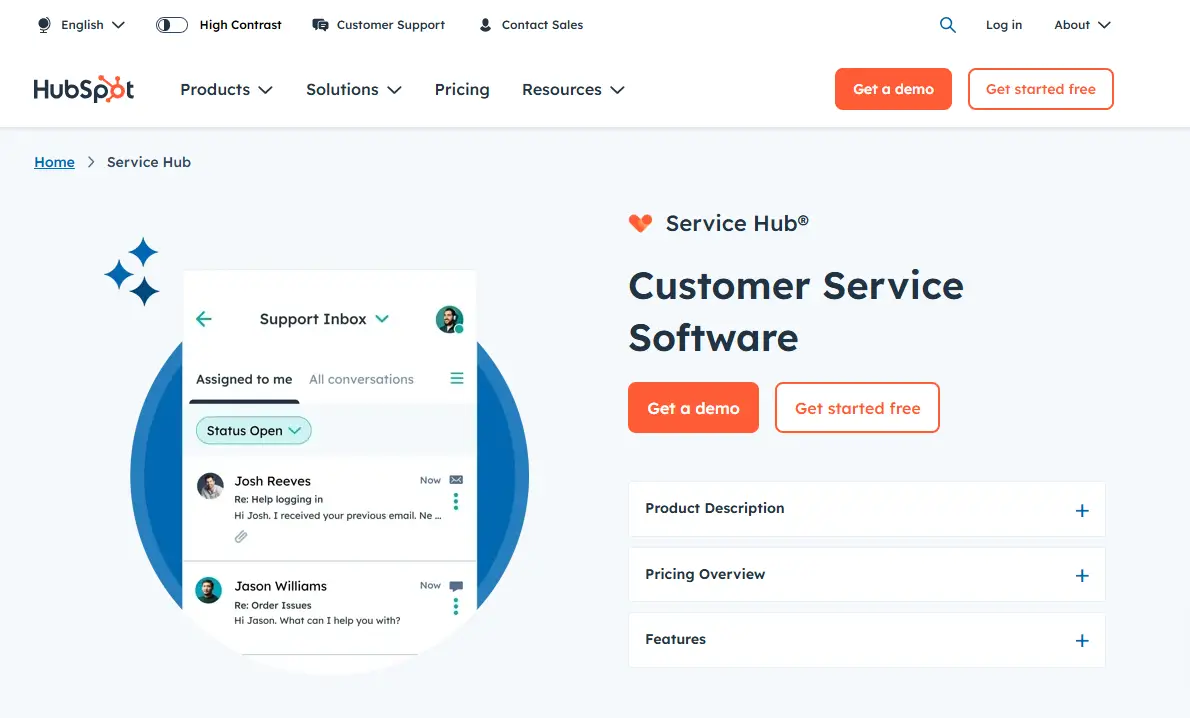
- Key Features:
- Seamless integration with HubSpot’s marketing and sales tools.
- Detailed reporting and analytics dashboards.
- Workflow automation for Customer service processes.
- Pricing:
Starts at $45 per month. - Ideal For:
Companies already using HubSpot’s ecosystem or those prioritizing seamless integration across marketing, sales, and support. - Pros:
- Great for businesses already using HubSpot’s ecosystem.
- Unified platform for marketing, sales, and customer service platform.
- Advanced automation features.
- Cons:
- Pricing can escalate as your team grows.
- Limited customization for non-HubSpot users.
4. Zoho Desk
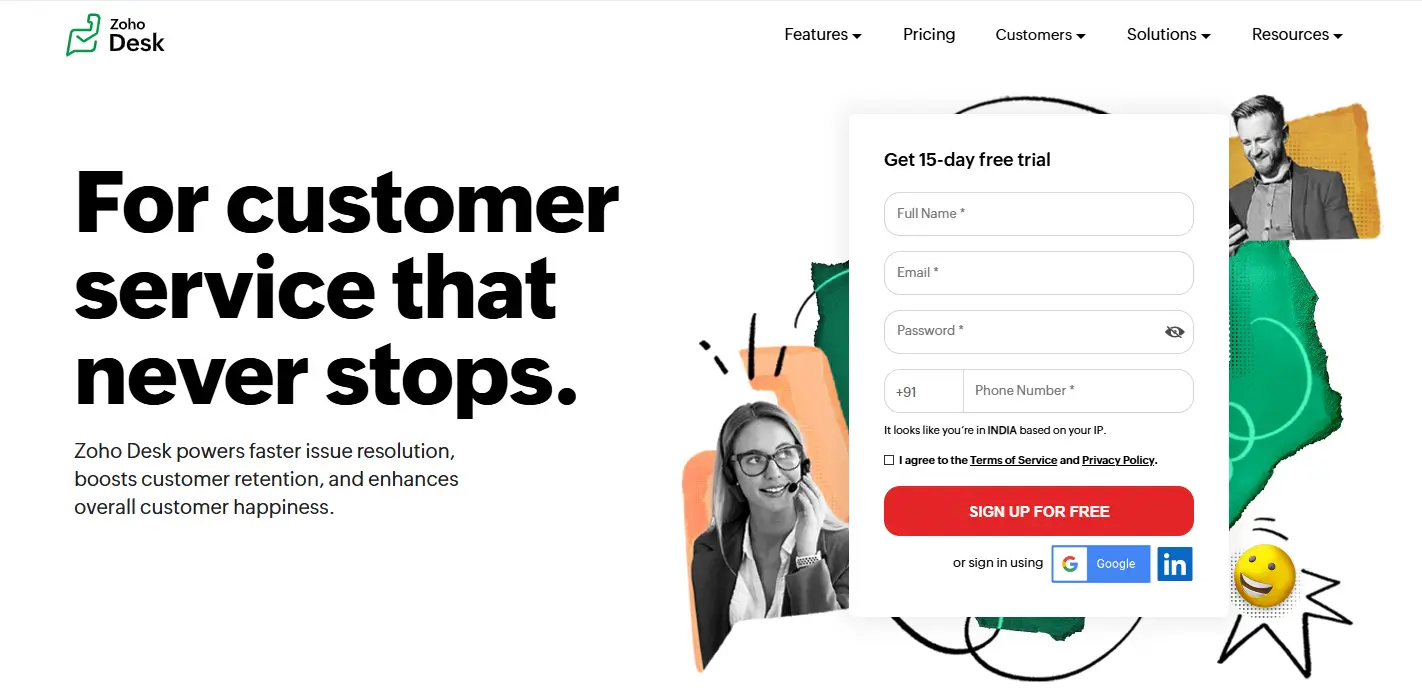
- Key Features:
- AI-driven assistants for customer queries.
- Multilingual support for global teams.
- Centralized hub for customer communications.
- Pricing:
Starts at $14 per agent/month. - Ideal For:
SMBs needing a scalable, budget-friendly platform with advanced features. - Pros:
- Cost-effective with flexible pricing plans.
- Strong AI and automation capabilities.
- Great for scaling small businesses.
- Cons:
- Interface can feel outdated compared to newer tools.
- Limited advanced analytics.
5. Salesforce Service Cloud
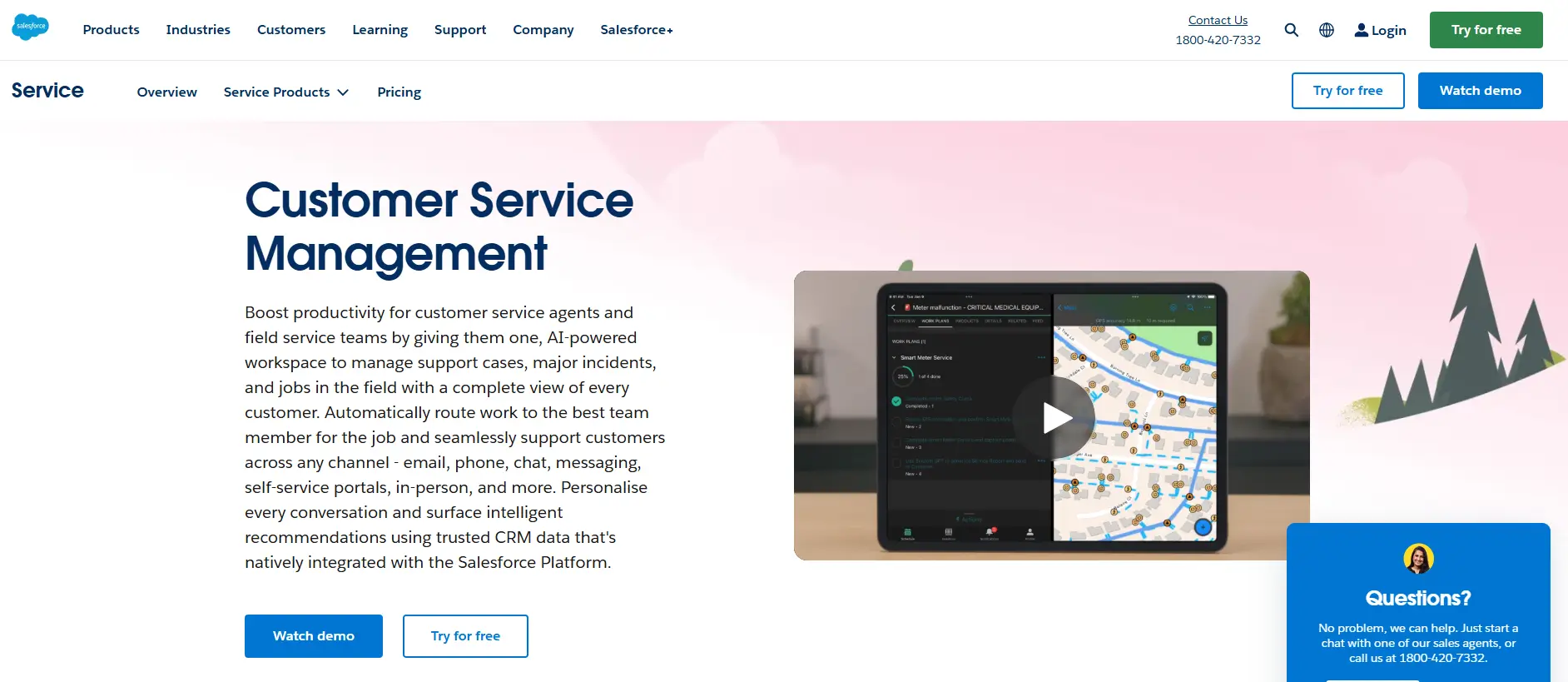
- Key Features:
- Full integration with Salesforce CRM.
- Advanced AI for customer inquiries and automation.
- Comprehensive customer support solution for enterprises.
- Pricing:
Starts at $25 per user/month. - Ideal For:
Mid-sized to large enterprises looking for a high-performance tool to manage complex customer service software. - Pros:
- Industry leader with a proven track record.
- Customizable for complex customer service platform
- Best for large-scale operations.
- Cons:
- Steep learning curve for new users.
- High cost for advanced features.
6. Intercom
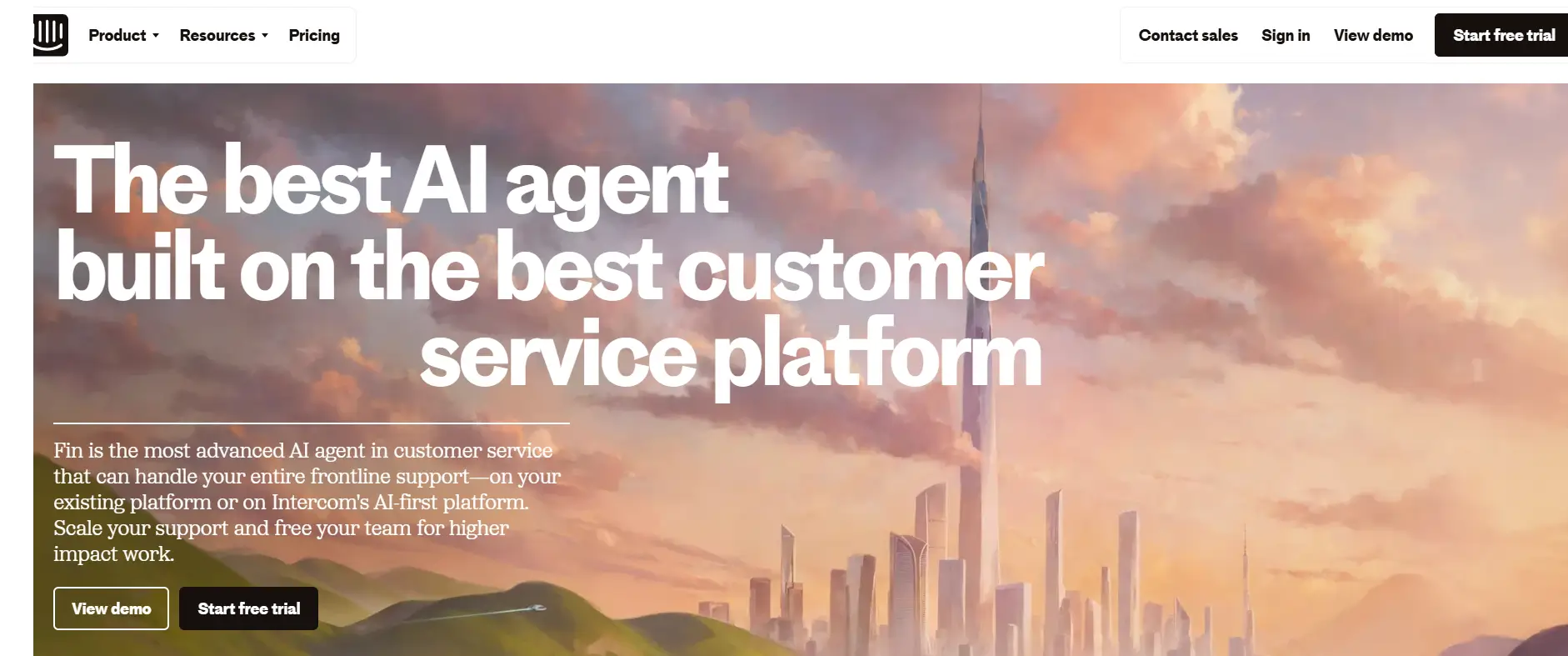
- Key Features:
- Real-time customer conversations through live chat.
- Tools for targeted messaging based on customer’s history.
- Integration with e-commerce platforms.
- Pricing:
Starts at $74 per month. - Ideal For:
SaaS companies and startups prioritizing conversational, real-time support. - Pros:
- Focus on conversational and proactive support.
- Excellent for boosting customer engagement.
- Integrates with various platforms.
- Cons:
- Expensive for smaller teams.
- Lacks robust reporting and analytics tools.
7. Help Scout

- Key Features:
- Simplified ticket management system.
- Collaboration tools for support agents.
- Customizable workflows and a self-service customer portal.
- Pricing:
Starts at $20 per user/month. - Ideal For:
Small businesses and startups needing an easy-to-use help desk. - Pros:
- Clean, straightforward interface.
- Affordable for small businesses.
- Strong focus on collaboration.
- Cons:
- Fewer integrations compared to competitors.
- Limited scalability for larger teams.
8. LiveAgent
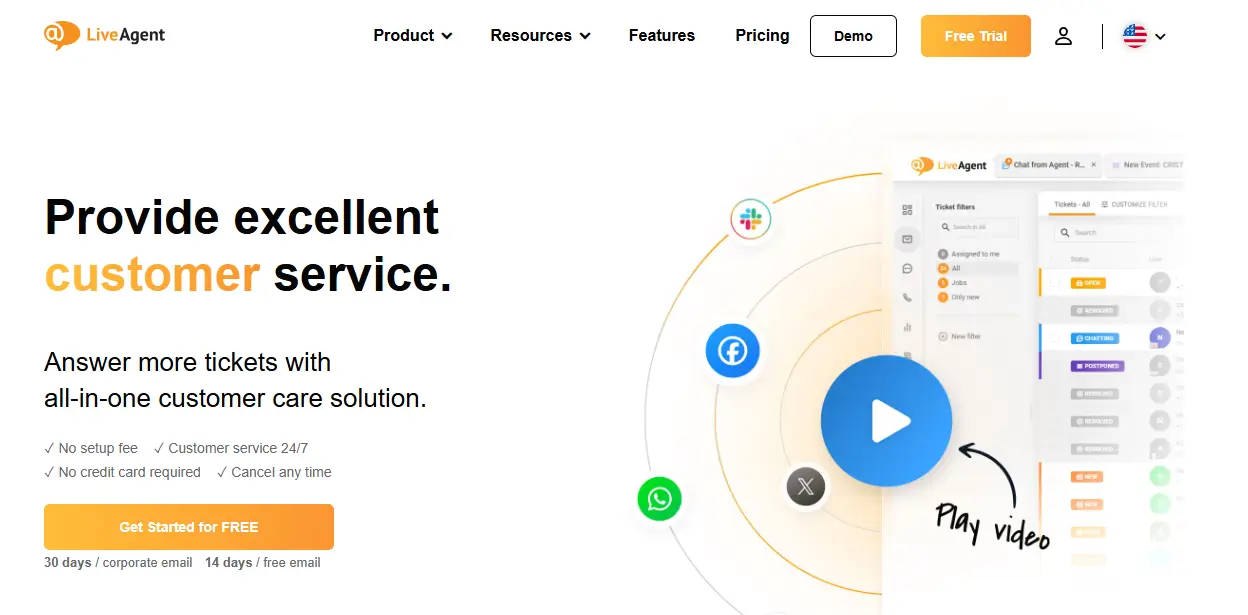
- Key Features:
- Multi-channel capabilities for live chat, phone, and email.
- Centralized customer interaction knowledge management.
- AI-driven knowledge management tools.
- Pricing:
Starts at $15 per agent/month. - Ideal For:
SMBs and e-commerce businesses managing a high volume of customer queries. - Pros:
- Affordable with strong omnichannel support.
- Excellent self-service options.
- High agent productivity features.
- Cons:
- Interface can feel cluttered.
- Not ideal for enterprise-scale needs.
9. Kayako
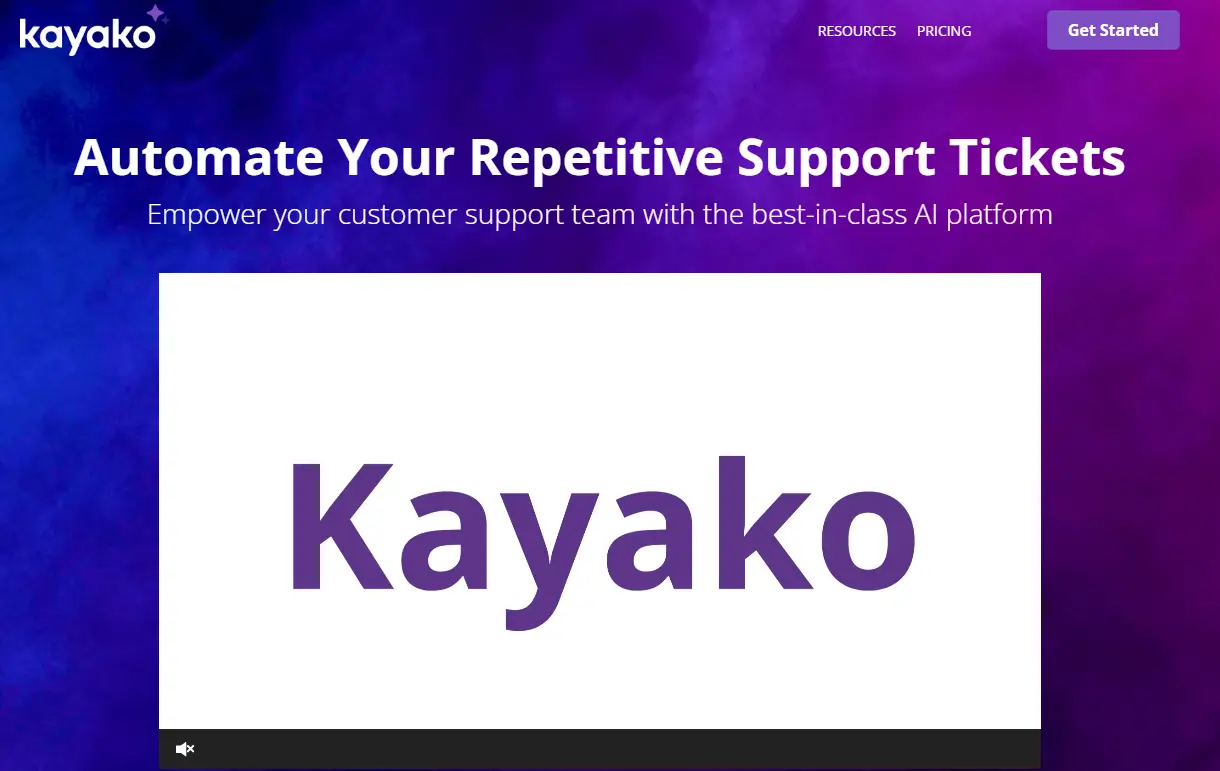
- Key Features:
- Unified inbox for all communication channels.
- Tools for personalized customer service teams using customer’s history.
- Built-in knowledge base.
- Pricing:
Starts at $15 per agent/month. - Ideal For:
Teams prioritizing seamless collaboration and tailored customer conversations. - Pros:
- Easy to set up and use.
- Strong focus on personalized interactions.
- Budget-friendly pricing.
- Cons:
- Limited scalability for larger teams.
- Fewer advanced features compared to top competitors.
10. Front
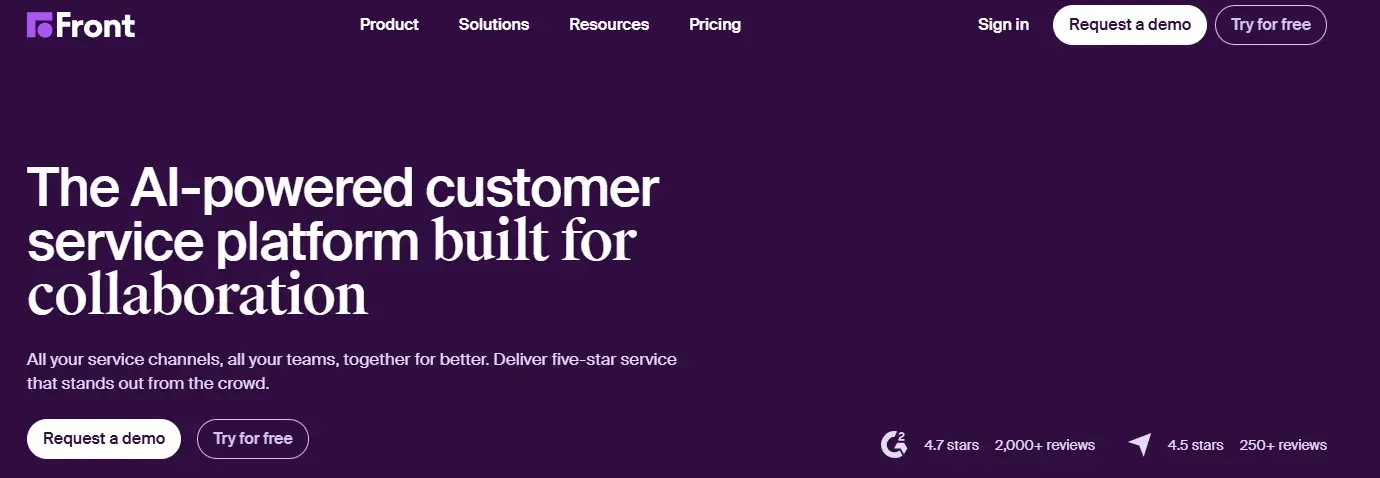
- Key Features:
- Shared inbox for team collaboration.
- Advanced tools for task automation.
- Detailed analytics tools for team performance.
- Pricing:
Starts at $19 per user/month. - Ideal For:
SMBs and startups wanting a collaborative, all-in-one inbox solution. - Pros:
- Excellent collaboration features.
- Simplifies workflows for smaller teams.
- Integrates well with CRMs and project management apps.
- Cons:
- Limited features for larger enterprises.
- Less focus on AI-driven automation.
11. Gorgias
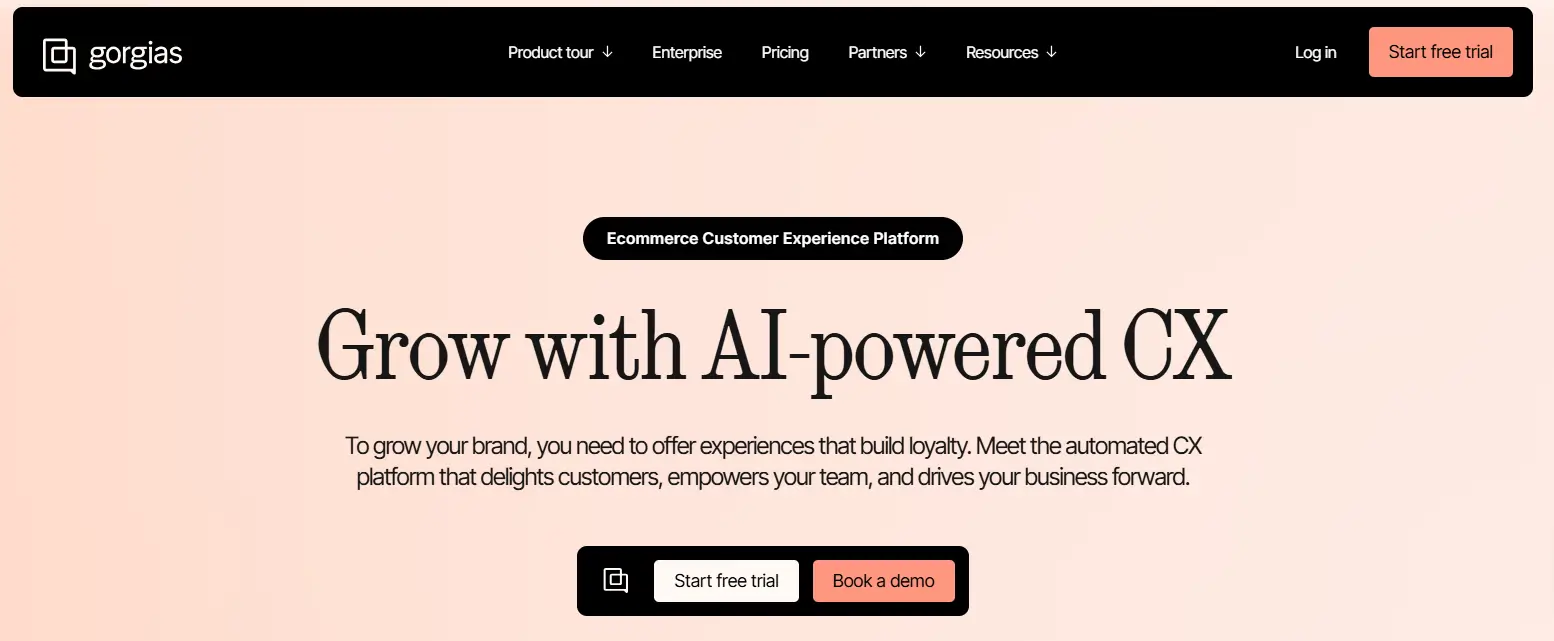
- Key Features:
- Tailored for ecommerce businesses.
- Integration with Shopify, Magento, and other platforms.
- Omnichannel support for customer interactions.
- Pricing:
Starts at $10 per user/month. - Ideal For:
E-commerce brands looking for a tailored customer service tool. - Pros:
- Affordable entry-level pricing.
- Optimized for e-commerce customer needs.
- Simple automation for repetitive tasks.
- Cons:
- Limited features outside of e-commerce use cases.
- Scalability is restricted for non-retail industries.
12. Sprinklr Modern Care
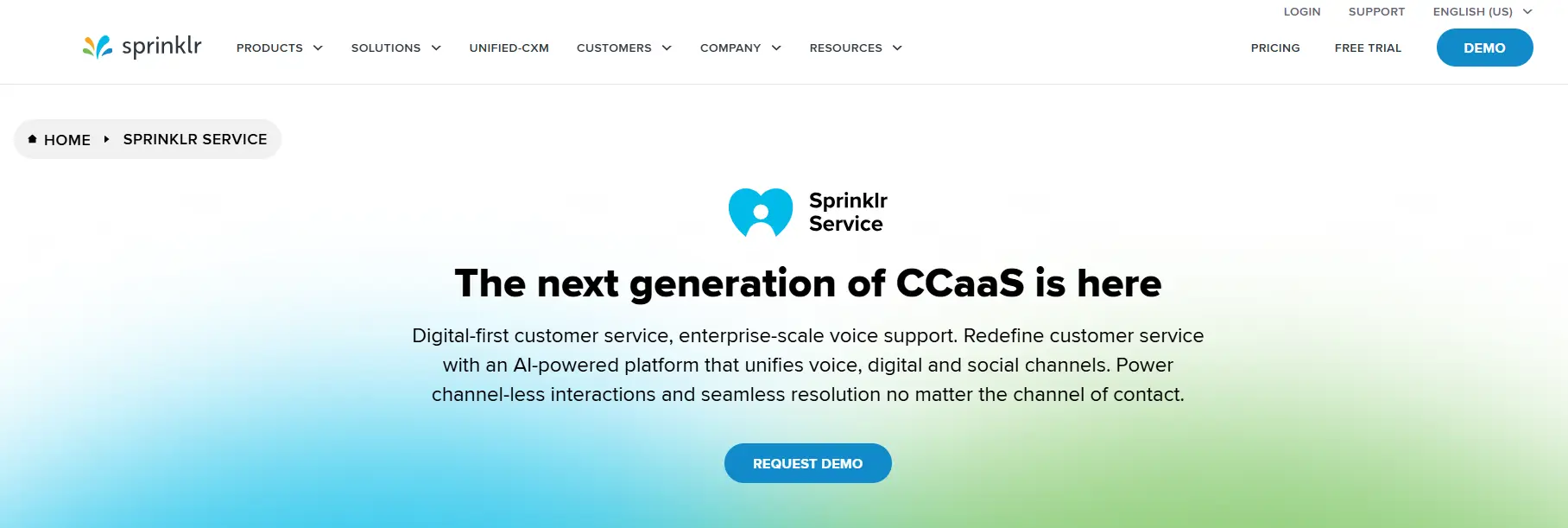
- Key Features:
- AI-powered insights for proactive customer communication.
- Centralized platform for handling customer queries.
- Integration with marketing and CRM tools.
- Pricing:
Custom pricing based on business needs. - Ideal For:
Large enterprises with complex customer support performance and multi-channel requirements. - Pros:
- Powerful AI and automation capabilities.
- Ideal for large-scale enterprises.
- Excellent for managing high volumes of customer interactions.
- Cons:
- Not suitable for smaller teams due to pricing.
- Complex to set up and use initially.
Comparison Table of Gladly Alternatives
| Platform | Starting Price | Key Features | Ideal For | Pros | Cons |
|---|---|---|---|---|---|
| Desku | $18/month for up to 5 agents (billed annually) | Omnichannel support, automation, reporting and analytics, live chat | Businesses of all sizes | agent productivity, reliable and secure | customization options are limited |
| Freshdesk | $15/agent/month | AI-driven ticketing, knowledge base | Startups, SMBs | Budget-friendly, intuitive interface | Limited advanced features |
| HubSpot Service Hub | $45/month | CRM integration, workflow automation | HubSpot users, scaling teams | Unified ecosystem, strong automation | Pricing scales quickly |
| Zoho Desk | $14/agent/month | AI assistants, multilingual support | SMBs, global teams | Affordable, AI-driven | Outdated interface, limited analytics |
| Salesforce Service Cloud | $25/per user/month | CRM integration, AI automation | Enterprises, complex workflows | Customizable, enterprise-grade features | Steep learning curve, high cost |
| Intercom | $74/month | Real-time chat, targeted messaging | SaaS companies, startups | Conversational support, proactive tools | Expensive, lacks detailed analytics |
| Help Scout | $20/per user/month | Simple ticket management, collaboration tools | SMBs, startups | Clean UI, affordable | Fewer integrations, limited scalability |
| LiveAgent | $15/agent/month | Multichannel support, knowledge management | SMBs, e-commerce | Affordable, strong self-service options | Cluttered UI, limited enterprise features |
| Kayako | $15/agent/month | Unified inbox, customer history tracking | Small teams, startups | Easy setup, personalized support | Limited scalability, fewer Premium capabilities |
| Front | $19/per user/month | Shared inbox, task automation | SMBs, collaborative teams | Great for collaboration, intuitive UI | Limited Enhanced options |
| Gorgias | $10/per user/month | E-commerce integrations, AI responses | E-commerce businesses | Optimized for retail, affordable | Limited non-retail features |
| Sprinklr Modern Care | Custom pricing | AI insights, omnichannel support | Large enterprises | Powerful AI, excellent for high volumes | Complex setup, high cost |
Implementation Considerations
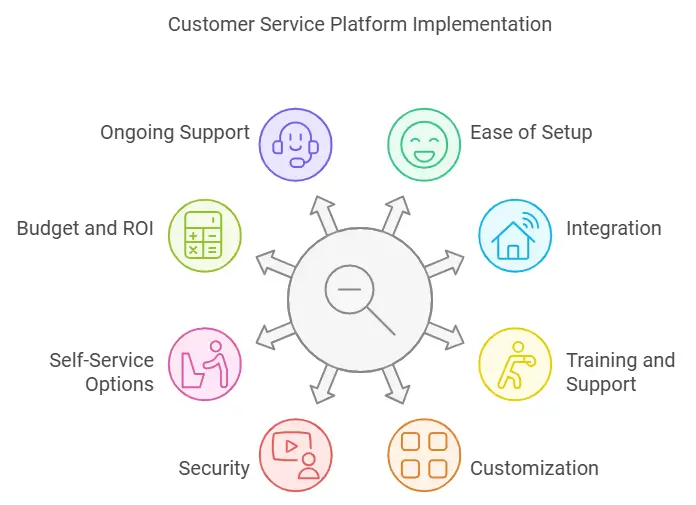
Selecting the right help Ticketing solutions is only half the journey. During implementation, analytics tools provide insights into agent performance and workflow bottlenecks, allowing businesses to optimize processes early on. Emphasize platforms with strong integration of analytics tools for onboarding, like Freshdesk or Zendesk. Successful implementation ensures the platform is integrated smoothly into your Service operations. Here are key factors to consider when implementing a customer service platform:
1. Ease of Setup
A seamless setup process minimizes downtime and ensures your customer support team can start using the platform quickly. Choose a solution with clear documentation, guided onboarding, or access to professional setup services. Platforms like Freshdesk and Help Scout are known for their intuitive setup processes, making them ideal for small businesses and startups.
2. Integration with Existing Tools
Ensure the help desk software integrates with your existing tech stack, including CRMs like Salesforce Service Cloud or HubSpot Service Hub, project management tools, and communication channels like email and social media. Integration reduces the need for manual data entry and centralizes customer interactions.
3. Training and Support
Comprehensive training resources such as webinars, tutorials, and dedicated support teams can make onboarding smoother. Platforms like Zendesk and Intercom offer extensive training materials to help support agents quickly adapt to new systems.
4. Customization and Scalability
The platform should be flexible enough to cater to your specific needs. Look for tools that allow customization of workflows, dashboards, and ticket management processes. Scalability is especially critical for startups scaling rapidly and SaaS companies expecting growth.
5. Security and Compliance
For industries handling sensitive customer data, robust security features are non-negotiable. Ensure the platform complies with customer data protection regulations like GDPR or HIPAA. Solutions like Sprinklr Modern Care and Salesforce Service Cloud offer enterprise-grade security to protect customer relationships.
6. Customer Self-Service Options
Consider whether the software provides features like a self-services knowledge base or customer portal. These features empower customers to resolve common issues independently, reducing the workload on your support team and improving Satisfaction benchmarks
7. Budget and ROI
Evaluate the agent-based pricing models and additional costs for extra features or integrations. Compare these with the potential return on investment, such as reduced response times, improved team productivity, and enhanced customer satisfaction.
8. Ongoing Support
After implementation, ongoing vendor support ensures you can troubleshoot issues and optimize the platform over time. Look for platforms with 24/7 support options or dedicated account managers for higher-tier plans.
By addressing these considerations, businesses can transition smoothly to a new customer service tool, ensuring improved customer experience and operational efficiency from day one.
Case Studies and Testimonials
Understanding how other businesses have benefited from specific Gladly alternatives can help you make an informed decision. A SaaS startup implemented Freshdesk’s AI-powered live chat to reduce response times and handle inquiries during peak hours efficiently. Here are some examples of how these tools have transformed customer support operations:
1. Zendesk: Scaling Customer Support for a SaaS Giant
A SaaS company with over 500 employees needed a solution to centralize customer conversations across multiple communication multiple channels. Zendesk helped them implement an automated ticket management system and robust reporting and analytics tools, resulting in a 35% increase in agent productivity and faster resolution times including social media.
Testimonial:
“Zendesk’s automation features saved us countless hours every week. Our team can now focus on providing personalized support rather than juggling tickets.” – Customer Support Manager
2. Freshdesk: Boosting Efficiency for a Growing E-Commerce Brand
An e-commerce business handling 2,000+ customer inquiries per month adopted Freshdesk to streamline their customer communication process especially through high-volume multiple channels like social media, where their customers frequently engage with the brand. With the platform’s self-service knowledge base and AI-driven automation, they reduced ticket volumes by 20% while maintaining high Customer happiness metrics. Freshdesk’s knowledge base includes AI-powered suggestions to guide users to relevant articles.
Testimonial:
“Freshdesk was easy to set up, and the results were immediate. Our customers love the self-service options, and our support agents are more productive than ever.” – Operations Lead
3. HubSpot Service Hub: Strengthening Relationships for a Startup
A SaaS startup struggling with fragmented customer data implemented HubSpot Service Hub to unify customer interactions with their marketing and sales platforms. This improved their customer support team’s ability to provide personalized customer service and increased customer engagement by 50%.
Testimonial:
“HubSpot gave us the tools to understand our customers better. With everything in one place, we’re delivering exceptional service and driving loyalty.” – Founder
4. Zoho Desk: Simplifying Support for Small Businesses
A small IT services firm adopted Zoho Desk to replace their outdated email-based support system. Using automated workflows and collaboration features, they resolved 25% more tickets within the first month and improved team efficiency significantly. Zoho desk focuses on conversational support, with real-time live chat that helps businesses engage customers proactively.
Testimonial:
“Zoho Desk fit perfectly into our budget while offering High-level functionalities. Our support performance metrics have improved dramatically.” – IT Manager
5. Salesforce Service Cloud: Enhancing Support for a Mid-Sized Enterprise
A mid-sized retail enterprise needed a scalable solution for managing their growing customer support operations. Salesforce Service Cloud helped integrate their customer data and provided tools for personalizing customer interactions across touchpoints. This led to a 40% reduction in resolution times. Salesforce offers an integrated knowledge base for easy customer access to FAQs and guides.
Testimonial:
“Salesforce Service Cloud is a game-changer for our customer service teams. The analytics tools and automation are top-notch.” – Customer Experience Director
6. Desku : Empowering E-Commerce Teams
A Shopify-based e-commerce store with a high volume of daily customer inquiries turned to Desku. The platform’s tailored integrations with Shopify and focus on automation reduced repetitive tasks, enabling the team to focus on customer satisfaction.
Testimonial:
“Desku gave us exactly what we needed—an ecommerce-focused customer service tool. We can now respond to customers faster and build stronger customer relationships.” – Store Owner
These success stories highlight how choosing the right customer service platform can optimize your customer service process and deliver measurable results.
FAQs
1. What is the most important feature to consider when choosing a help desk solution?
The most important feature depends on your business needs. For small businesses, ease of use and affordability are key. For larger enterprises, features like automation tools, reporting and analytics, and scalability matter most. Regardless of size, omnichannel support and a user-friendly interface are essential.
2. How does Gladly alternatives compare to its alternatives?
Gladly alternatives focuses heavily on personalize customer interactions and omnichannel support, making it great for businesses prioritizing customer-centric strategies. However, alternatives like Zendesk and Freshdesk may offer better pricing or more Premium capabilities like robust Automated solutions and self-service capabilities.
3. Are these alternatives suitable for startups or small businesses?
Yes, many of these platforms, such as Freshdesk, Help Scout, and Zoho Desk, are designed for small businesses and startups. They offer affordable pricing plans, simple interfaces, and scalability to grow with your business.
4. Which help desk software is best for e-commerce businesses?
Desku is a top choice for Online retailers, thanks to its seamless integration with Shopify, Magento, and other platforms. It provides tools for managing customer communications across multiple channels and automates repetitive tasks, making it ideal for high-volume support needs.
5. How much do help desk solutions typically cost?
Pricing varies widely. Basic plans can start as low as $10 per user/month (e.g., Desku or Zoho Desk), while enterprise-level solutions like Salesforce Service Cloud can go up to $150+ per user/month. Many platforms offer free trials or tiered pricing based on features.
6. Can these platforms handle social media customer support?
Yes, most alternatives like Zendesk, Freshdesk, and Sprinklr Modern Care have robust social media integration features. They allow businesses to respond to customer inquiries, track brand mentions, and even manage advertising campaigns directly from the platform.
Conclusion
Choosing the right help desk solution is crucial for improving customer support operations and delivering a better customer experience. While Gladly alternatives offers strong features, exploring alternatives can lead you to tools better suited to your business’s unique needs, budget, and growth plans. a platform that integrates smoothly with social media can elevate your team’s ability to engage and support customers effectively.
From platforms like Zendesk and Freshdesk offering powerful automation tools, to tailored solutions like Desku for ecommerce businesses, the right choice depends on your team’s priorities. Whether it’s enhancing agent productivity, integrating seamlessly with existing tools, or providing robust self-service options, there’s a Gladly alternative for every use case. A well-maintained knowledge base is a game-changer for customer support. By empowering customers with self-service options, it reduces the workload on your agents and boosts satisfaction levels. While choosing a help desk comprehensive solution, prioritize platforms that offer robust analytics tools.
What’s next?
Evaluate your current customer support team’s challenges and goals. Use the comparison table and case studies to shortlist a few platforms. Schedule demos, ask for trials, and involve your empowers support teams to ensure the chosen tool aligns with your workflow.
With the right help desk software in place, your business can deliver exceptional customer support, streamline operations, and boost Client feedback scores for the long term.
- About the Author
- Latest Posts
Gaurav Nagani was the Founder of Desku, an AI-powered customer service software platform.
- Email Management: Best Strategies, Tools & Tips for SaaS and Ecommerce
- Shared Inbox Guide: Definition, Benefits, Tools & Best Practices 2025
- LivePerson Pricing Exposed: What They Don’t Show You on Their Website
- Automate Customer Support with AI A Practical Guide
- Desku vs UsePylon: Which One Scales Better for Startups?


